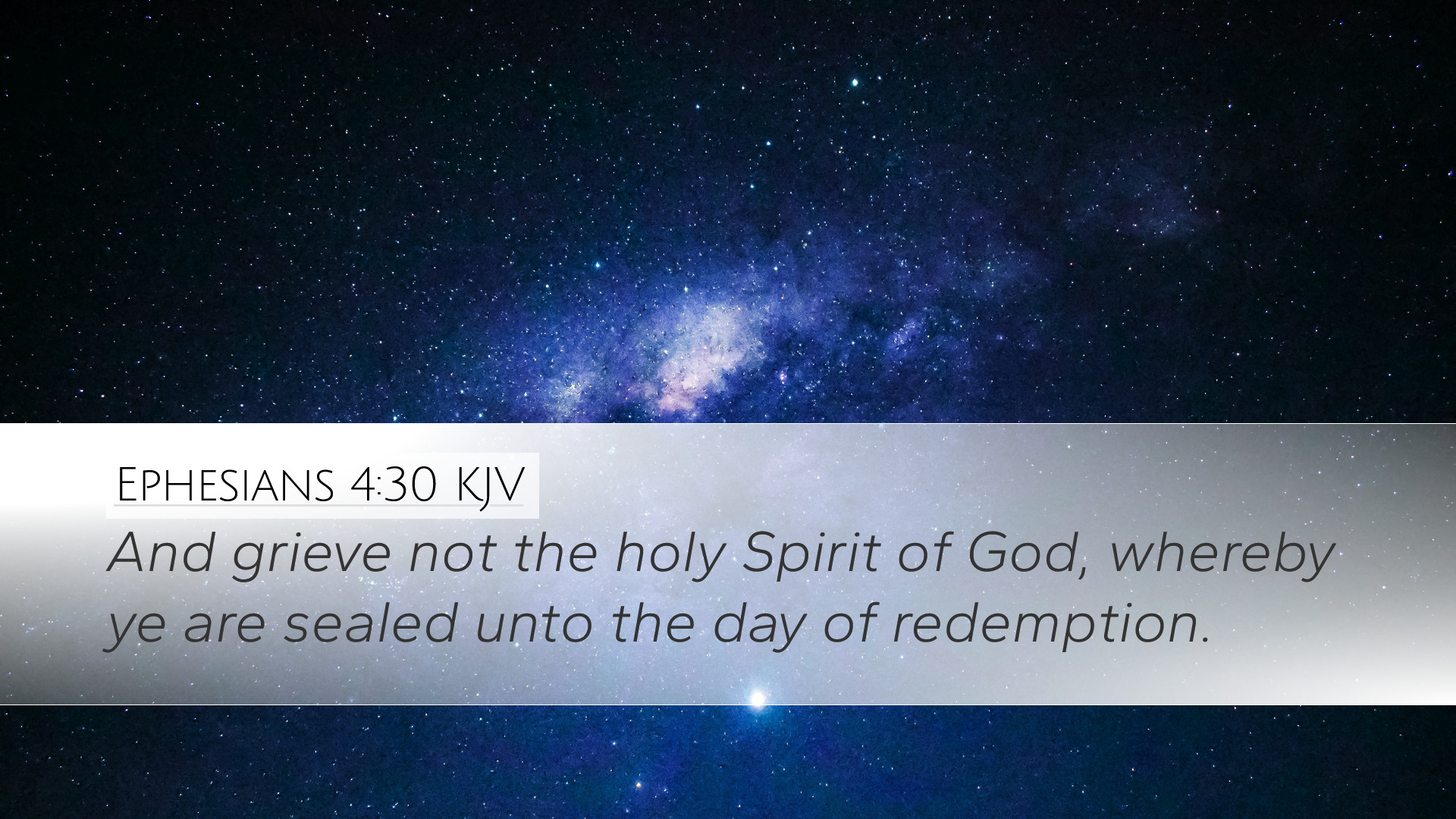Ephesians 4:30 - Commentary and Insights
Verse: “And grieve not the holy Spirit of God, whereby ye are sealed unto the day of redemption.” (Ephesians 4:30)
Contextual Overview
This verse is situated within the practical section of Paul’s epistle to the Ephesians, where he discusses living in a manner worthy of one's calling. It emphasizes the moral and spiritual conduct expected of Christians and the significant role of the Holy Spirit in their lives.
Exegesis and Detailed Commentary
Matthew Henry provides a pastoral perspective on this verse, stressing that the command to not grieve the Holy Spirit reflects the intimate relationship between believers and the Spirit. Henry highlights that grieving the Spirit is tied to actions that oppose God’s will and disrupt fellowship with Him.
Albert Barnes elaborates on the deep implications of grieving the Holy Spirit, explaining that it relates to the believers’ conduct and the impact of their sins. He notes that one’s sinful actions can generate sorrow for the Spirit, who is present to guide, instruct, and sanctify the believers. Barnes adds that if believers ignore this guidance, they are effectively resisting the Spirit’s work in their hearts.
Adam Clarke offers a theological reflection on the nature of the Holy Spirit and the sealing mentioned in this verse. He explains that the Spirit is both a Comforter and a Witness, assuring believers of their salvation. Clarke emphasizes the significance of being 'sealed' by the Holy Spirit—that it is a divine mark of ownership, protecting believers until their ultimate redemption. He warns that grieving the Spirit reflects a serious affront to this divine presence and can jeopardize one’s relationship with God.
Theological Implications
The idea of grieving the Holy Spirit raises critical theological questions about the nature of sin and its impact on the believer’s life. The Holy Spirit’s role as the divine Comforter and guide means that an ongoing relationship requires attentiveness to His leading.
- Covenantal Relationship: The essence of this relationship is one of commitment and fidelity. Just as one can grieve a close friend or partner through betrayal, so too can one grieve the Spirit through unrepentant sin.
- Seal of Redemption: The sealing of the Holy Spirit guarantees believers' inheritance. Therefore, to grieve the Spirit is not only a relational misstep; it also has eschatological consequences, affecting one’s assurance of salvation.
- Reflection of Character: The way believers behave reflects their understanding and relationship with the Holy Spirit. Paul presents a call to holiness, implying that the fruits of the Spirit should manifest in their lives.
Practical Applications
Pastors, theologians, and students of Scripture may find these applications important for preaching and teaching:
- Self-Examination: Encourage congregants to regularly assess their lives in light of this verse, reflecting on areas where they may be grieving the Spirit. Self-examination promotes spiritual health.
- Emphasis on the Spirit’s Role: Teach the importance of the Holy Spirit in the life of a believer, reinforcing the understanding of His active role in guiding and convicting.
- Pursuing Holiness: Church leaders should promote a culture of sanctification, where believers aspire to live in accordance with the Spirit’s leading and resist the temptations that lead to grieving Him.
Conclusion
In summary, Ephesians 4:30 serves as a significant reminder of the delicate and profound relationship between believers and the Holy Spirit. It underscores the theological truth that believers are sealed by the Spirit, a mark of divine ownership that should inspire reverence and careful living. The insights from public domain commentaries contribute richly to understanding how this verse operates within the broader theme of Christian conduct and spirituality.


